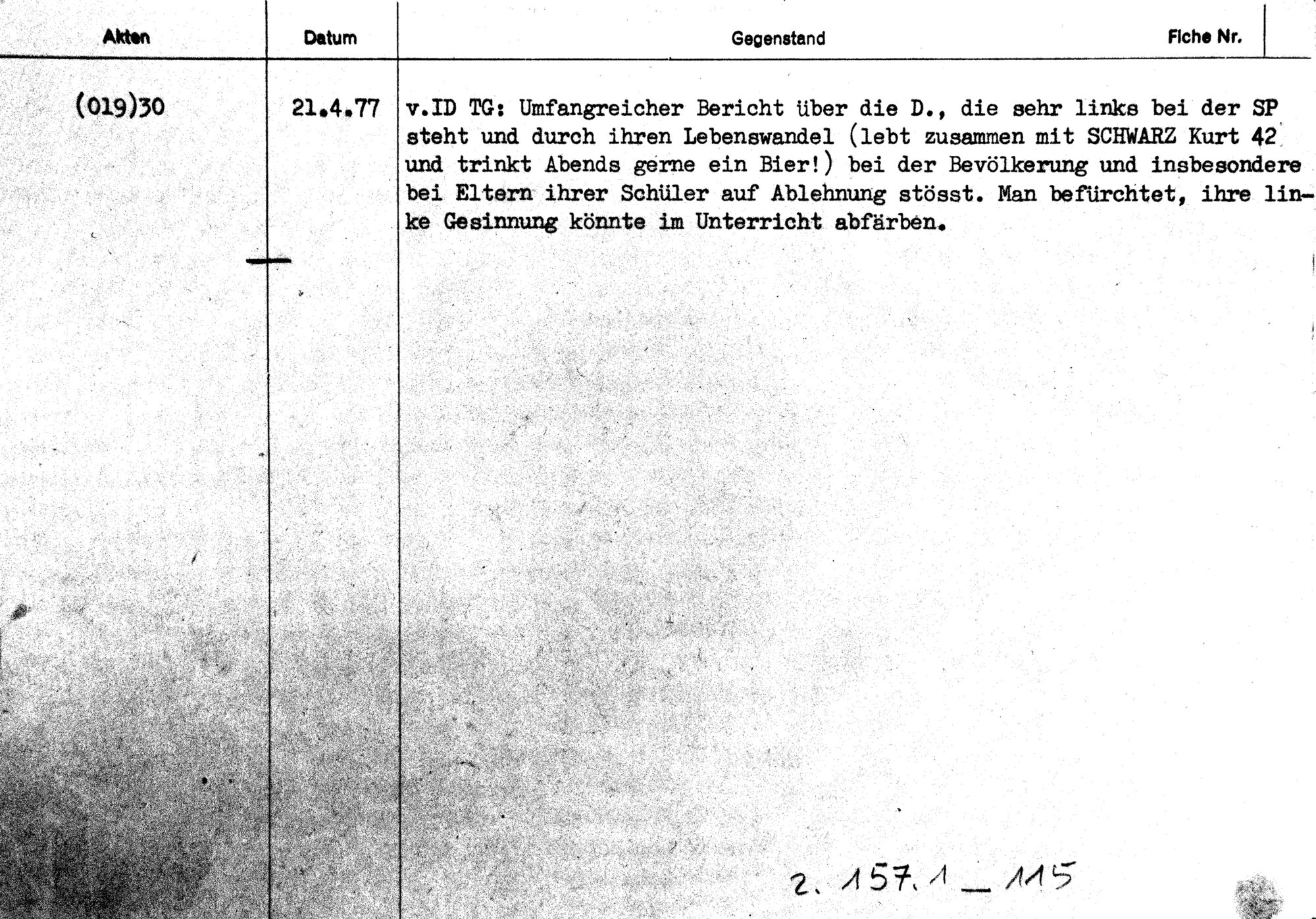Surveillance always deals with projections; with expected or imagined threats and with resentments. Influenced by conscious or subconscious bias, images are crafted, crimes are suggested, and ultimately whole stories are written. The agent for the secret police acts here as author, director, dramaturge, and scenographer all wrapped up in one. The work M. D. trinkt abends gerne ein Bier is a fictional story based on a collection of surveillance protocols. Through a text co-written by an artificial intelligence software, the work shines a spotlight on the state watchdog (rather than the person being spied upon) to examine the creative and suggestive potential of surveillance.

The secret file ("fiche") of Menga Danuser, member of the Swiss National Council. (Swiss Federal Archives, E4320-01C#1996/203#115*)
The fall of the Berlin Wall ushered in the end of the Cold War. The alleged “enemies of Switzerland” suddenly vanished into thin air. And with that, the analogue secret files kept on citizens by the Swiss surveillance state became obsolete. Hundreds of thousands of index cards lost their bureaucratic purpose as a surveillance reference system. An outgrowth of a Cold War waged inside the country; the secret files are a written legacy of anti-communist fervor and surveillance practices, bearing witness to an imaginary, distorted view of purported enemies of the state. In the late 1980s, the decades-long practice of surveillance became public knowledge, sparking a highly emotional and intense political debate that shook the foundations of Switzerland’s self-image as a liberal, constitutional democracy. Hundreds of thousands of citizens demanded access to the files kept on them by the state security apparatus, now realizing for the first time that a “secret authoring authority” in the person of the state security officer had been co-writing their biography.
The “secret files” affair was accompanied by the implicit hope of an end to the subjective arbitrariness and bias evident in so many of the surveillance documents. At the same time, advances in digitalization promised the kind of numerically measurable objectivity and accuracy that had never before been possible. Instead, it appears that the problem was merely shifted from a personal to a structural level. Rather than eliminating fundamental ethical questions concerning surveillance bias (prejudice, cognitive distortion), the digitalization of government and private surveillance tools rendered them even more pressing due to the scalability of datasets.
Studies show that facial recognition software, for example, has inbuilt biases related to race, age, and gender. This raises the question of who is programming the AI and which datasets are used to do so. A significant problem is that women make up just ten percent of software developers worldwide, and only three percent of employees at the largest US tech companies identify as black. Last November, UNESCO member states signed the “Recommendation on the Ethics of Artificial Intelligence,” an international call, couched in unusually urgent terms, for artificial intelligence to be put at the service of people. The goal is to provide effective legal remedies against discrimination based on biased algorithmic decisions and against AI-driven mass surveillance.
The work M. D. trinkt abends gerne ein Bier consists of a series of fictional short stories based on a set of real surveillance protocols. The focus is on the creative and theatrical aspects of surveillance: the actors, settings, props, and scripts. With the help of storytelling software that uses artificial intelligence, the protocols were augmented to create short tales. The subjective viewpoint of Swiss security officers in the 1970s and 80s is perpetuated here in the narrative suggestions (and thus the inherent bias) of the software used.
David Gugerli, Hannes Mangold: Einleitung, in: Max Frisch: Ignoranz als Staatsschutz? hrsg. von David Gugerli und Hannes Mangold, Berlin 2015, S. 7-26, hier S. 13.
Gregor Huber, New Media, ZHdK
Lukas Nyffenegger, Department of History, UZH
Ivan Sterzinger, Department of Psychology, UZH